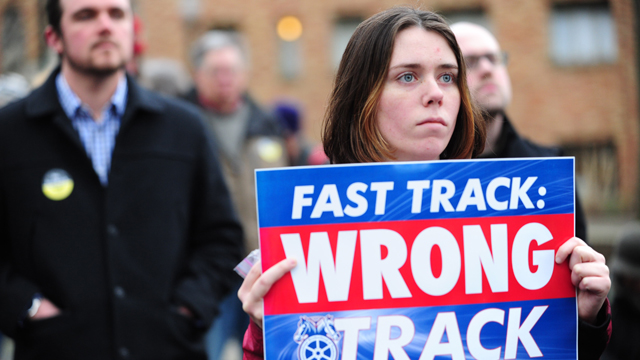
A protester holds a sign against the fast-track authority for the TPP during a protest in Portland, Oregon, on January 31, 2014. (Photo by Alex Milan Tracy/NurPhoto/Sipa USA)
Die, monster, die! Every time you think that beast called the Trans-Pacific Partnership — TPP for short — is finished, it comes back like a bad penny; or in this case, trillions and trillions and trillions of bad pennies.
A few weeks ago, talks in Maui collapsed and the massive trade deal, affecting some 40 percent of the world’s economy, seemed close to death. But no amount of stakes through the heart or flaming torches or even witch-dissolving buckets of water can seem to keep this behemoth down. There they all were at the Westin hotel in Atlanta on Monday, the trade representatives of a dozen Pacific Rim countries, grinning ear-to-ear at a press conference announcing that after eight years and several days of extra, non-stop finagling, the fix was in.
So now, as we head toward the climax of this horror story, it’s going to take all of us villagers storming the monster’s lair with our pitchforks to bring TPP down.
Like all manmade, fantastical creatures, this TPP thing has been conceived in secret. Top secret. You could even go to jail for divulging its contents. Few have been able to see the actual text — all 30 chapters of it — except for some 600 “cleared advisors,” the majority of whom are from big business, and even they have been restricted in what they’re allowed to examine.
In May, one of the non-business cleared advisors, Michael Wessel, wrote in Politico that he and his colleagues were also “prohibited from sharing publicly the criticisms we’ve lodged about specific proposals and approaches. The government has created a perfect Catch 22: The law prohibits us from talking about the specifics of what we’ve seen, allowing the president to criticize us for not being specific… What I can tell you is that the administration is being unfair to those who are raising proper questions about the harms the TPP would do.”
In fact, political scientists Michael Colaresi and Nathan Jensen polled fellow political scientists for The Washington Post and found that their comments “suggest that secrecy has little impact on helping the U.S. get a better deal. Instead, it helps insulate the government from interest-group pressure, whether from business on the left or environmental and labor groups on the left.”
Most of all we know so far has been the result of Wikileaks and a twelve-page summary issued by the US Trade Representative when the deal was announced on Monday. The American Prospect’s David Dayen said, “There appears to be improvements around the edges: preventing tobacco companies from using the investor-state dispute resolution process, a lower exclusivity period for high-cost biologic drugs. But these are pretty small. The main structure of the agreement was already in place, one designed to protect incumbent profits and sacrifice U.S. jobs, with very dubious claims about labor and environmental standards that have simply never been enforced in other trade agreements, including by this administration.”
So, if upheld and obeyed, there are bans on child workers and pledges to allow collective bargaining in countries that have brutally oppressed organized labor. Conservation groups are happy about measures to fight wildlife poaching and overfishing. But there are also patent and market exclusivity rules that restrain competition, worries about food safety, a snare of complications for intellectual property and internet freedom, rules that could allow multinational corporations to run roughshod over the regulations of allegedly sovereign nations and much more. “For us, any TPP is making things worse,” Peter Maybarduk, director of the the access-to-medicines program at the public interest group Public Citizen, told The New York Times. The pharmaceutical industry in particular “will have many more tools with which to defend its monopoly business model.”
The good news is, there’s still time. Many, many details still need to be worked out before the entire TPP text must finally be revealed. Weeks and months will pass before a harshly divided Congress confronts the monster — it may not be until April of 2016, amidst our presidential election year. What’s more, as we all know, “The public is demonstrating a lot of dissatisfaction with the traditional ways of doing things in Washington.” So former diplomat Clyde Prestowitz told The American Prospect. “This deal is not going to reduce economic inequality in the U.S. Rather it is going to add to it. If some of the presidential candidates pound away at that fact, it is possible to foresee a wave of public frustration and anger leading to defeat of the TPP in the Congress.”
Even though, in a squeaker vote this summer, Congress gave President Obama fast-track authority that only allows the House and Senate to vote up or down on TPP without changes or amendments, they still could vote no on this whole monster of a mess. Most of the presidential candidates are opposed, including Bernie Sanders, Donald Trump, and now, even Hillary Clinton, although she was an advocate when she was secretary of state. “As of today, I am not in favor of what I have learned about it,” she told the PBS Newshour’s Judy Woodruff on Wednesday,“…I don’t believe it’s going to meet the high bar I have set.”
And don’t forget the 11 other countries that are party to TPP — their legislatures have to sign off, too, and there’s tremendous opposition in many of those nations. Members of our Congress opposed to this deal, like New York Democrat Louise Slaughter, are working closely with their opposite numbers abroad.
Yes, big business will bankroll yet another enormous public relations campaign to push this agreement through, and as the Center for Responsive Politics’ Open Secrets blog reported this week, “Over eight years of negotiations, 487 clients paid lobbyists to meet with or contact lawmakers and administration officials to discuss the trade pact… Clients who reported lobbying on TPP accounted for nearly thirty percent of all lobby spending.”
But as we’re fond of saying, the best way to fight organized money is with organized people. Time to mobilize one more time and finally take this rampaging monster down for good.



